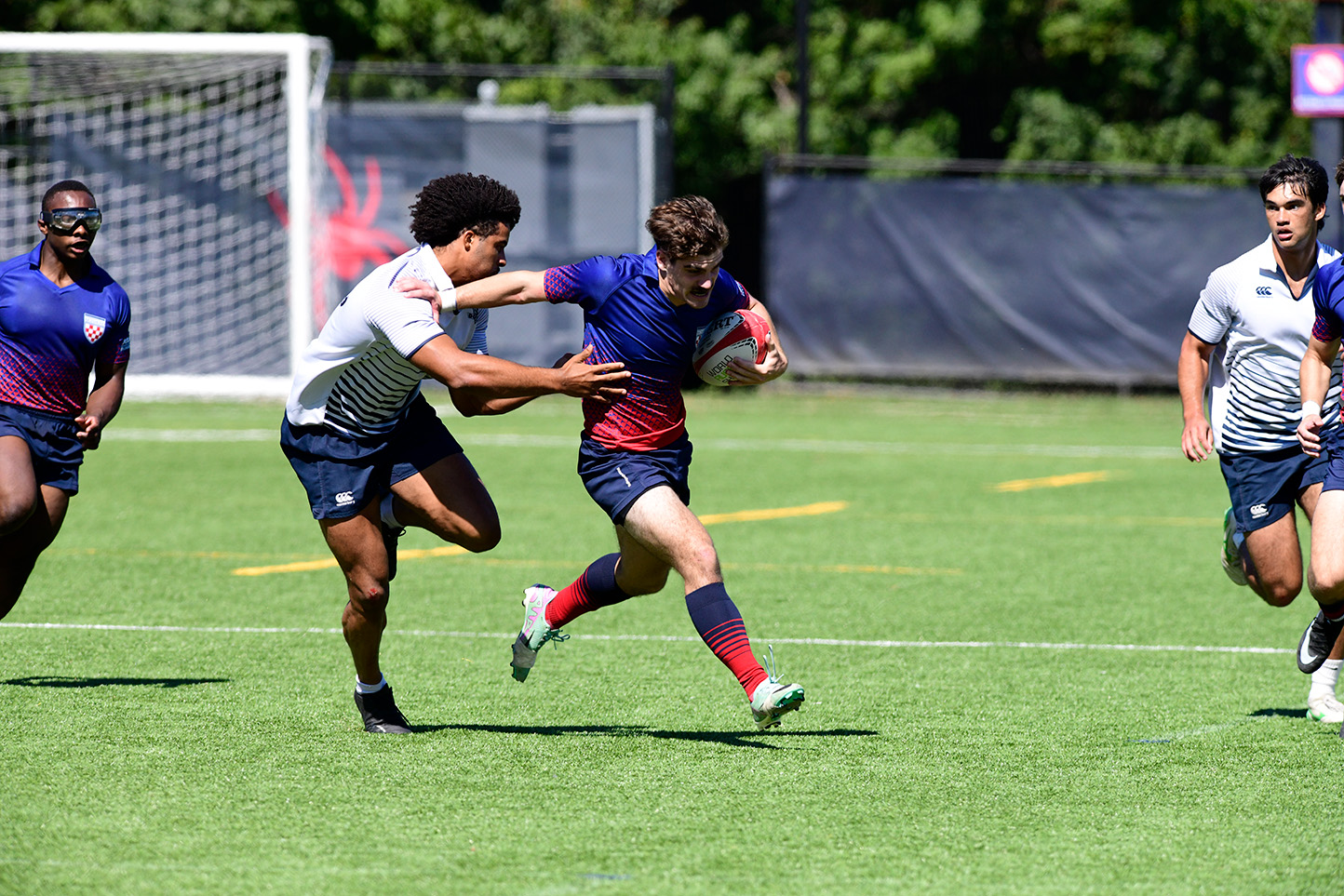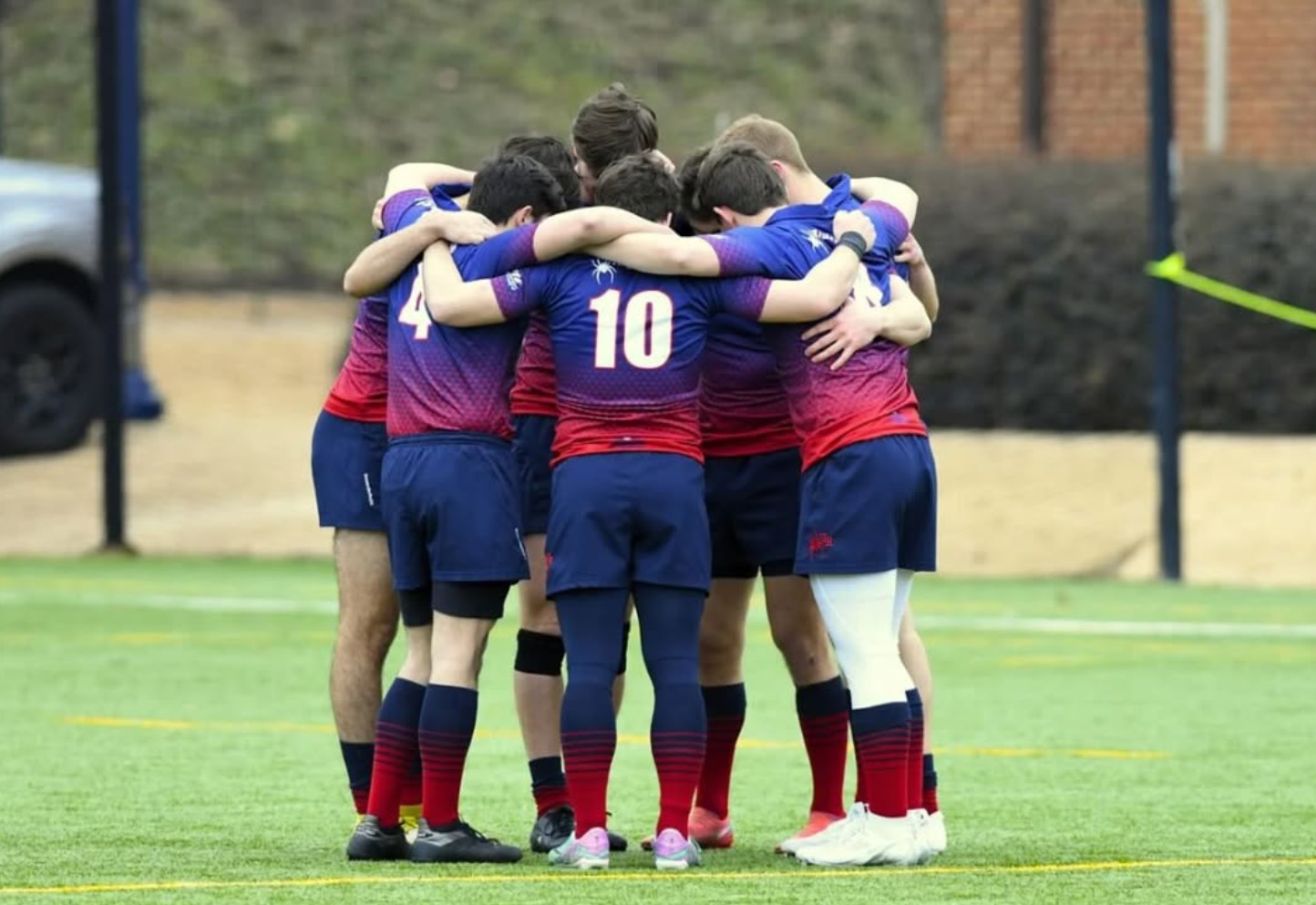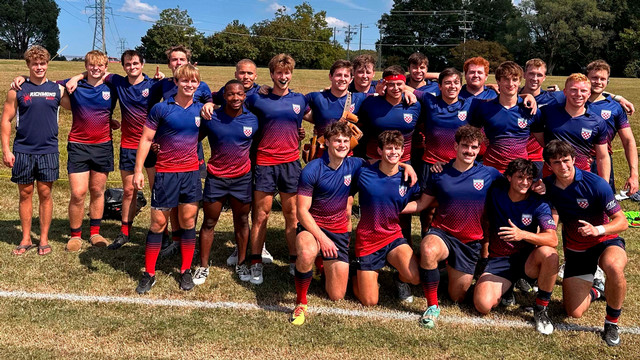Spiders charge onto the national rugby scene
Student Experience
The University of Richmond Men’s Rugby Club first took the field over 50 years ago. Today’s program is disciplined, tight-knit, and nationally competitive, said coach Matthew Wilson. The camaraderie that first drew players together still runs through its core.
Since its inception in 1971, the club has evolved from a recreational outfit that competed in a Virginia conference into one of the country’s top small-college teams. Competing in the Southern Rugby Conference for the first time this fall, the Spiders now face programs from across Virginia, the Carolinas, and beyond. The change marks another step forward for a club that’s risen steadily in recent years, said coach Patrick Benner, who also serves as Richmond’s senior director of campus life.
“We’re competing exceptionally well,” Benner said. Despite Richmond’s loss against Duke on Oct. 4, its performance drew national attention, leading it to crack the top 20 small U.S. college teams in the National Collegiate Rugby Division III Top 20 Coaches Poll.

And in a rematch on Nov. 2, #11 Richmond defeated #1 Duke in the Southern Rugby Conference semi-final. “We moved on to play for the Conference Championships against #5 Virginia Military Institute this past Saturday, and although we didn't win, our victory against Duke secured us an NCR DIII Round One play-off game this weekend as we host Loyola."
These changes reflect just how far the club has come since Wilson joined in 2002 after moving to Richmond from South London. Back then, the club was small and mostly social. “We really started stepping up our game about six years ago,” Wilson said. “We were getting more and more kids coming through who had a lot of experience and played rugby in high school.”
No experience necessary
Under Wilson and Benner’s leadership, the program has become both competitive and accessible. The club’s repeated assertion — “no experience necessary”— is not just lip service. Players come from a range of athletic backgrounds, and many first encounter rugby at Richmond. “It’s about teaching them the absolute basics first,” Wilson said. “Catch, pass, tackle. If you can do those three things, we can make a rugby player out of you.”
That philosophy has attracted first-year students like Kyler Avila, who arrived from Las Vegas this fall. A chance encounter at the gym led a club member to invite Avila to the next practice. “I knew absolutely nothing about rugby,” he said. “I’d never seen it played before.”
Within weeks, Avila was a contributor on the field and a believer in the team’s culture. “Everybody’s accepting. If you’re new to the game, they understand that feeling because they were all in your shoes at one point,” he said.
Benner and Wilson have a coaching dynamic — that Wilson describes as an “old married couple” — which has proven key to the team’s steady progress. Benner, who has worked at Richmond since 2001 and played and refereed rugby across the country, embodies the sport’s physical and passionate spirit. He has more of a peer-like, brotherly connection with the players, while Wilson is more of an authoritative figure.
Together, they’ve guided the Spiders through consecutive standout seasons, including three back-to-back trips to the National Collegiate Rugby Sevens Championships. Last spring, Richmond finished as Shield Champions at Nationals, closing a campaign with 31 wins.
Beyond the metrics, Wilson said the team’s character and chemistry help to set it apart. “They all take it so seriously, but they also hang out together and enjoy each other’s company,” he said. “That’s a great dynamic. If you like each other, that translates onto the field as well.”

Lifetime bond
The club’s impact extends beyond campus, with Richmond alumni and the local rugby community regularly turning out for games. After the first Duke match, Wilson said, “The boys dragged themselves off the field, and probably about 100 people all stood up and applauded them. And then the boys stood and applauded them back.”
Benner sees that same spirit in his players’ academic and personal achievements. “We’ve had more than 40 guys recognized as NCR Scholastic All-Americans over the last three years,” he said. “They’re not only competitive on the field. They’re competitive in the classrooms.”
For newcomers like Avila, the bonds built through rugby extend well beyond the pitch. “I feel at home now,” he said. “It’s like a whole community. It’s uplifting to be a part of a team that supports you, especially coming from the other side of the country.”
That culture of inclusion and growth is what Wilson hopes prospective players see in the club and pursue even after graduation. “Rugby is played in almost every major city in the majority of countries all over the world,” he said. “All you need to do is go and find the local rugby club. You will have 50 or 60 like-minded people who will welcome you in. It’s a global community.”

